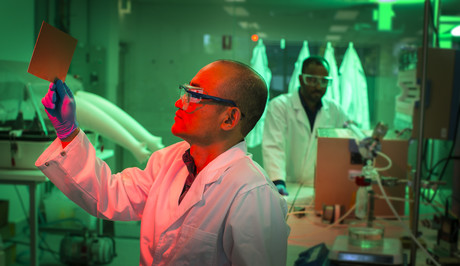Atom-thick coating can prevent metals from corrosion

Researchers from the University of Wollongong (UOW) have demonstrated that a coating of a single-atom thickness can protect metals from corrosion, thus marking a significant milestone for the field of nanoelectronics.
In conventional electronics, polymer coatings are routinely applied to metallic surfaces to protect them from corrosion. For devices built at the nanoscale, where space is extremely limited, there is need for a coating that is ultrathin yet still provides protection. This is what the researchers from UOW’s Institute for Superconducting and Electronic Materials (ISEM) sought to achieve.
The research team, led by Dr Zhenguo Huang, coated copper with a 2D hexagonal boron nitride film (BNNF) and then used microscopes and spectroscopy to study how well the film protected the copper from corrosion. BNNF was chosen for its insulating nature, impermeability to small molecules, robustness, transparency and chemical stability.
Writing in the journal Advanced Materials, the researchers found that the quality of the BNNF, rather than its thickness, proved to be the critical factor for protection. Copper coated with a high-quality, atom-thick layer of BNNF showed “outstanding anti-corrosion resistance”, they said, but corrosion was actually increased when the copper had a thicker but poorer quality coating that was discontinuous and had cracks in it.
“To make the protection effective, the layer has to be very high quality,” said Dr Huang. “You have to make it defect-free and continuous over a large surface.”
Dr Huang said the findings have significance for the development of the next generation of nanoelectronics, which will require atomically thin coatings. The next step, he said, is to test the coating on materials other than copper.
Vitamin B2 production integrated into food fermentation
Researchers have successfully produced vitamin B2, also known as riboflavin, in significant...
Desalination breakthrough could bring fresh water to the world
Researchers have found a way to make sea water evaporate faster than fresh water, in a...
Nanoplastics can reduce effectiveness of antibiotics
Using complex computer models, researchers were able to prove that nanoplastic particles can bind...





